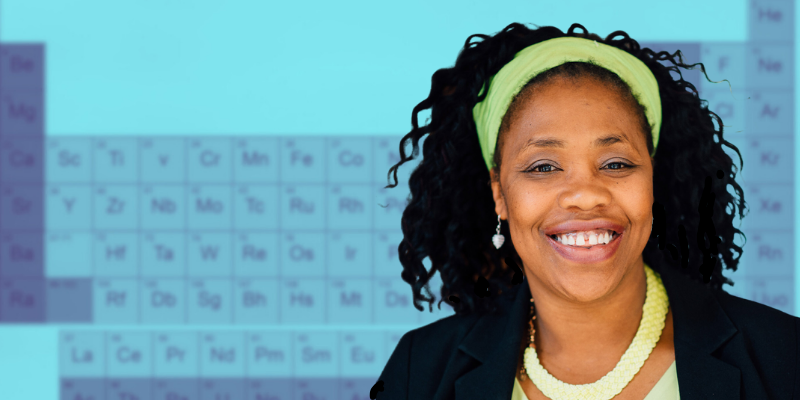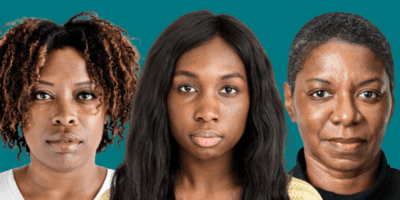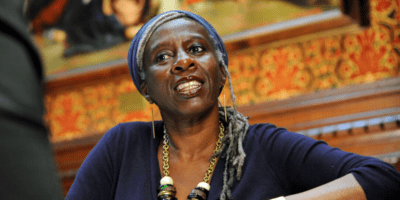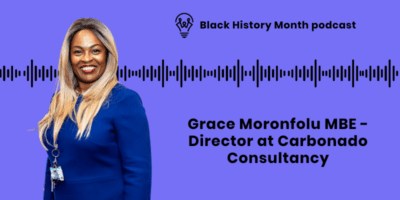Dr Marcia Philbin is the chief executive of the Faculty of Pharmaceutical Medicine, the membership body for doctors involved in the development, regulation and provision of medicines, which advances the science and practice of pharmaceutical medicine for the benefit of the public. She started her work life by conducting research in chemistry, becoming a Chartered Chemist, before moving into management roles. Marcia is also a Fellow of the Royal Society of Chemistry and a Fellow of the Association for Project Management and was recently awarded an Honorary Doctorate in Science from Aston University.
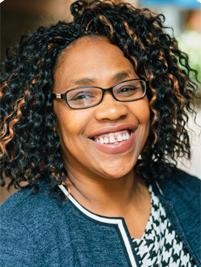
“What we have to remember is that the history we have is written from the perspective of those who are telling it, so we must examine the other side. What’s the other aspect of that history?”
Wonderful yet surreal
Here is a brief recap of my educational background and career to date. You can read the first piece I wrote for Womanthology here, but in summary, I did my degree, followed by my PhD in chemistry at Aston University, after 20 years working in the Ministry of Defence doing different things, I moved into postgraduate medical education.
Initially, I was assistant director for research and policy at the Royal College of Paediatrics and Child Health, and then four years later I became the chief executive of the Faculty of Pharmaceutical Medicine (FPM) in 2019. It’s been quite a journey!
In 2021, when I last spoke to you, we were just coming out of COVID. We were still in that ‘in, out, in, out, shake it all about’ territory with lockdown and then no lockdown. My focus has remained driving FPM, growing the organisation, expanding what we do, and responding to the needs of members.
In 2021, we received our first award, was amazing. It was a ‘Highly Commended’ Memcom award in the ‘Best Virtual Event’ category for our 2020 FPM Annual Symposium, which meant a lot as we weren’t allowed to deliver an in-person event due to the COVID restrictions. [Memcom is the senior leadership network for the professional membership sector, serving professional associations, membership organisations and the wider not-for-profit sector.]
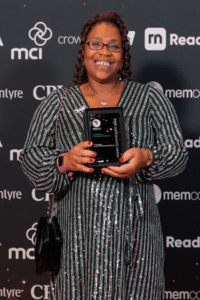
Then, in 2022, we put ourselves forward for some other awards and we were shortlisted. The one I found incredible is that the staff put me forward for the CEO Leadership Award at the Memcom Awards and I was shortlisted, as I also was for the Association Excellence CEO Leadership Award. I won the Highly Commended Memcom award for Leadership and gave a speech at their Christmas gathering, which was fantastic.
On top of that, I got the shock of my life at the start of this year. A letter came through that I hadn’t had a chance to open straight away, but when I opened it later that week I had to sit down and read it five times. It was from my university, Aston University, who awarded me an honorary doctorate in science in recognition of my career in STEM. The ceremony was in July and it was fantastic. My husband and my twin boys were there with front-row seats. I gave my speech and it was such an emotional feeling. I hadn’t even finished and people were applauding. It was just such a wonderful (yet surreal) experience!
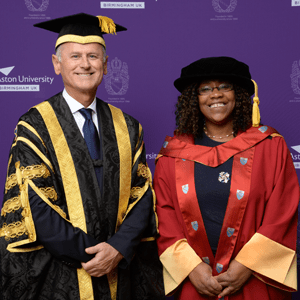
This year, I was also filmed for an Aston in Life YouTube video, where the University catches up with former graduates and postgraduates about their lives to encourage other people to come to Aston. This meant so much too as I just come from a humble background.
Then I was asked to speak at Rochester Cathedral for Windrush Day. I had joined a choir, called Joyful Voices, as something for me to do outside work and everything else. Because they knew that my family was from Jamaica, they asked if I would speak to give my reflections on Windrush Day, which I was proud to do.
Inclusive medicine = better medicine
The thing about medicines is that are there to help provide treatment, yet the way they are developed doesn’t encompass the full spectrum of society. This means that you’re not always going to be able to develop medicines that are reflective of and meet everybody’s needs, which is essential, particularly with the new advances in medicines and pharmacogenomics.
Pharmacogenomics looks at how medicines act on people from a genetic perspective, which means it’s all the more important we have that diversity when we’re developing medicines.
Also, there’s a talent pool of people from underrepresented groups, who can bring so much energy, different perspectives and new innovations, so they need to be involved because doing things one way doesn’t necessarily mean it’s the only way. We can do things differently and sometimes just by having someone look at something differently, they can do things more efficiently, more effectively.
From a regulatory point of view in terms of developing medicines, the Federal Drug Authority in America has issued regulations so that when companies are developing medicines, they need to ensure those involved in the clinical trials are diverse, are representative of communities. I know that the regulatory body in the UK, the Medicines and Healthcare products Regulatory Agency, known as the MHRA, is examining this as well.
I think it’s a shame that it has to take regulation before companies can do this. It says a lot about them, the fact that they have to be nudged into doing this. You have to ask yourself: “Why are they doing this?” But then the other question as well is to understand why underrepresented communities won’t put themselves forward, and it’s about trust.
There have been cases where companies and researchers have behaved badly. Last time, we spoke about Henrietta Lacks. Her cells were taken without her knowledge, without permission, and her family only found out 30 or so years after her death, and that was outrageous. Interestingly, in the news, I think it was about two months ago, it said that her family are finally going to be given compensation for everything they’ve gone through, but it’s taken all this time. (Remember, Henrietta Lacks died in the 1950s…)
That’s why it is essential to have diversity in terms of how you develop the medicines, who’s developing the medicines, who you’re developing the medicines for, and how they’re being developed. That means ensuring talented people from all different communities have the opportunity to be involved in this field, and to have a voice in what is being developed and who it’s been developed for, so they are working with the system and that the system is not working at odds with them.
Celebrating hidden history
I recently posted on LinkedIn to say that Black History Month isn’t always about trauma, but it’s also about celebrating the hidden history. History used to be written by a narrow proportion of society, usually white men, to tell their stories, but they ignored the stories of pretty much all women, regardless of race, as well as ignoring the stories of Black and Asian people.
What we have to remember is that the history we have is written from the perspective of those who are telling it, so we must examine the other side. What’s the other aspect of that history? Many people are still not vested in understanding our broader history, so having something like Black History Month is a reminder. There’s so much more to these stories that we don’t know about, so let’s find out more, and learn more to enrich our knowledge and understanding.
As part of this year’s Black History Month celebrations, I recently sat on a panel discussing Black Heroes of Mathematics. It’s incredible how many Black Heroes of Mathematics, people from history, are involved in maths and have done great things but you never hear about them.
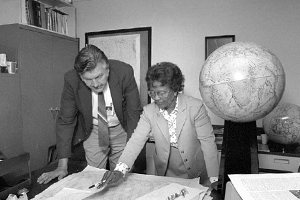
I was asked a question about Gladys West, the woman whose work became the basis for GPS [originally known as the Global Positioning System]. The maths she did is the reason we have GPS today but how often do we hear about her? That kind of thing is not taught in school, and it should be. We’re starting to teach about Katherine Johnson, Dorothy Vaughan, and Mary Jackson, but that’s only because of the film, Hidden Figures. There are so many others who have worked in this area and done things that are still without the recognition they deserve and this must change.
Long-awaited and hard-earned recognition for Black women
I think this year’s Black History Month theme of Saluting Our Sisters is fantastic because we know there is a hierarchy in terms of society and Black women are always at the bottom. This is why it means so much for Black women to have this celebration, this acknowledgement, because they’re the ones who hold the families together, they’re the ones who hold communities together, and they’re the ones who shoulder so much of the trauma and the distress.
But they’re also the ones who are championing and driving things forward, so that’s why I think it’s vital we have this acknowledgement of Black women because they support one another. I just think about my mother, what she went through and how she supported her sisters, and other women as well.
There are two other women I’d particularly like to mention. The first is Nichelle Nichols, who played Lieutenant Uhura in the original Star Trek TV series and film franchise. When I was growing up, Black representation on TV was always negative. Black women were either maids or were portrayed as being put upon and didn’t really have a voice. Then, all of a sudden, you have Nichelle Nichols, Lieutenant Uhura, and she’s a scientist, she’s an explorer, but she’s also an equivalent to White and Oriental people on the show.
It was just incredible, and it was brave because when she first appeared there were people who wanted to get her off the TV, so she wanted to give up, but she met with Martin Luther King, and he said to her that when she appeared on TV, everybody saw her, and that gave the Black community, Black children, Black men, Black women, hope to carry on doing what they were doing because it made such a difference. And that’s why she continued.
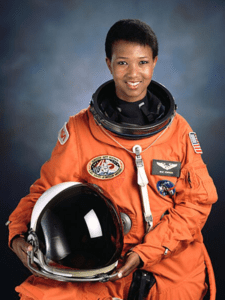
The other person I’d like to mention is Mae Jemison, the first Black woman who went into space. She became the first African-American woman to travel into space when she served as a mission specialist aboard the Space Shuttle Endeavour in 1992, orbiting the Earth for eight days. She had degrees in chemical engineering as well as African and African-American studies, before earning her medical degree and becoming a doctor, and then went on to join NASA’s astronaut corps in 1987.
Black History Month 2023
At FPM we’re celebrating Black History Month with two fireside chats. One is with Steve Fuller, who runs Race in STEM, an organisation that seeks to increase representation of Black people in STEM subjects. He interviews people and does podcasts, as well as being a recruitment consultant. He’s a huge advocate for effecting positive change in STEM.
We also have a fireside chat with the founders of a group called Black in Pharma, which was founded by three Black women who were all having similar experiences in the pharmaceutical industry. They started reaching out to other people and then realised: “Wow, there’s a lot of us having similar experiences.” So, they formed this network, providing mentoring and advice to many people working in the pharmaceutical industry. It’s grown exponentially and now they’re working with pharmaceutical companies to progress talent and open up pipelines to give people opportunities. Black in Pharma recently won a social enterprise award and it’s incredibly well-deserved.
I’ve been asked to give a talk at Durham University too. I’ve called it: From Impossible to I’m Possible. And as I mentioned before, I was on the Black Heroes of Mathematics panel, talking about how to increase representation in maths.
Coming up
Moving forward at FPM, we’re focused on developing our global presence, but also broadening the membership so that we encompass the doctors who have an interest in developing medicines. I’m incredibly excited to be working with the FPM team on this.
On a personal note, I’ve just come back from Cinque Terre in Italy for a long weekend away with friends from university. It was fantastic to catch up with them, having spent the weekend doing difficult hikes. I didn’t think the hikes would be that hard, but we did them together. There’s such a huge value in spending time with long-term friends and just being focused on you as a person, and not being a mother, not being a wife, not being a chief executive, not being somebody for somebody else, but just being there for you.
That was just so exhilarating and we all felt the same way, which really reinforced the importance of just doing something for you, no matter how simple it is. I hope to be able to make more time for things like this. I will keep you posted!

